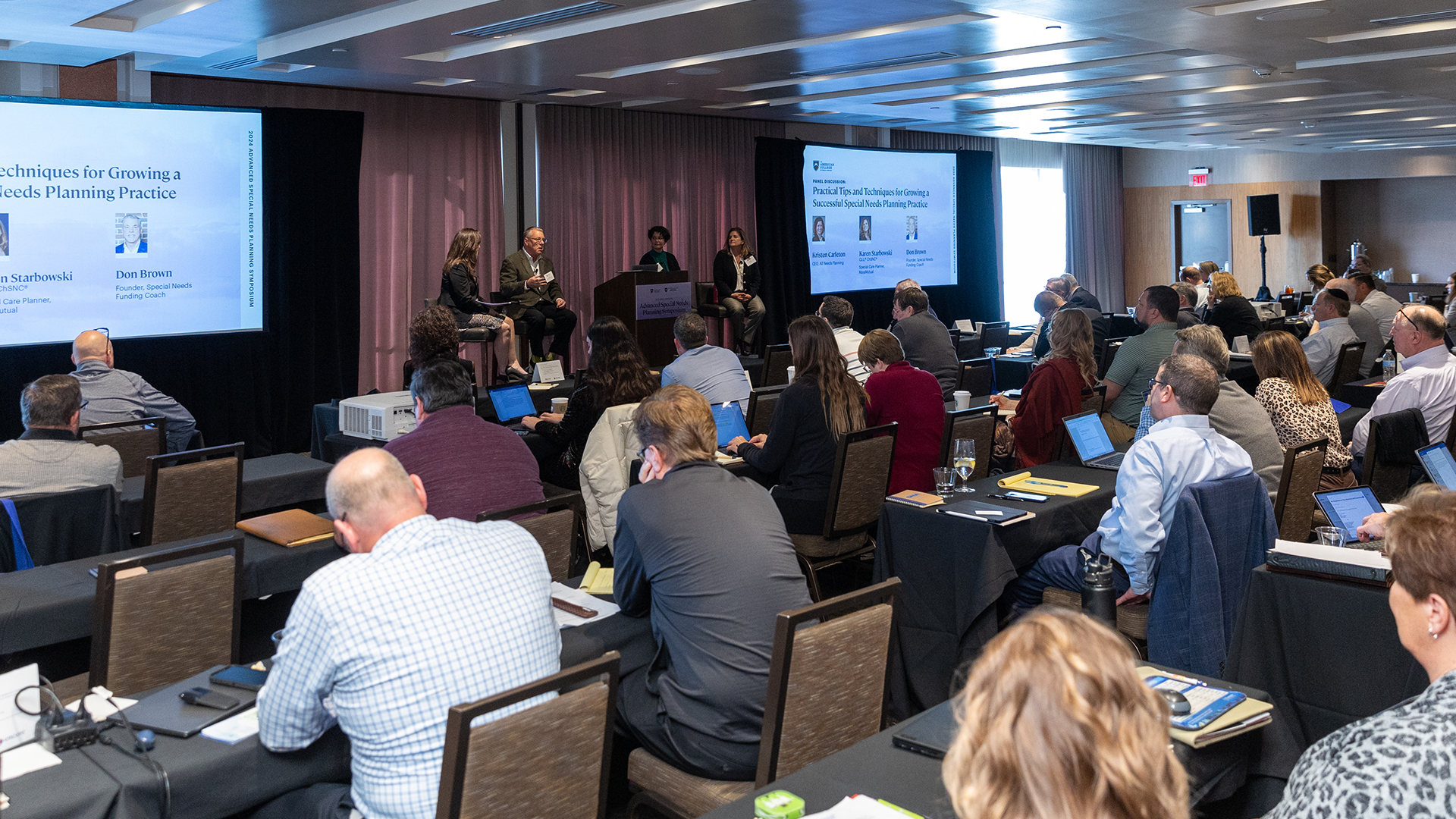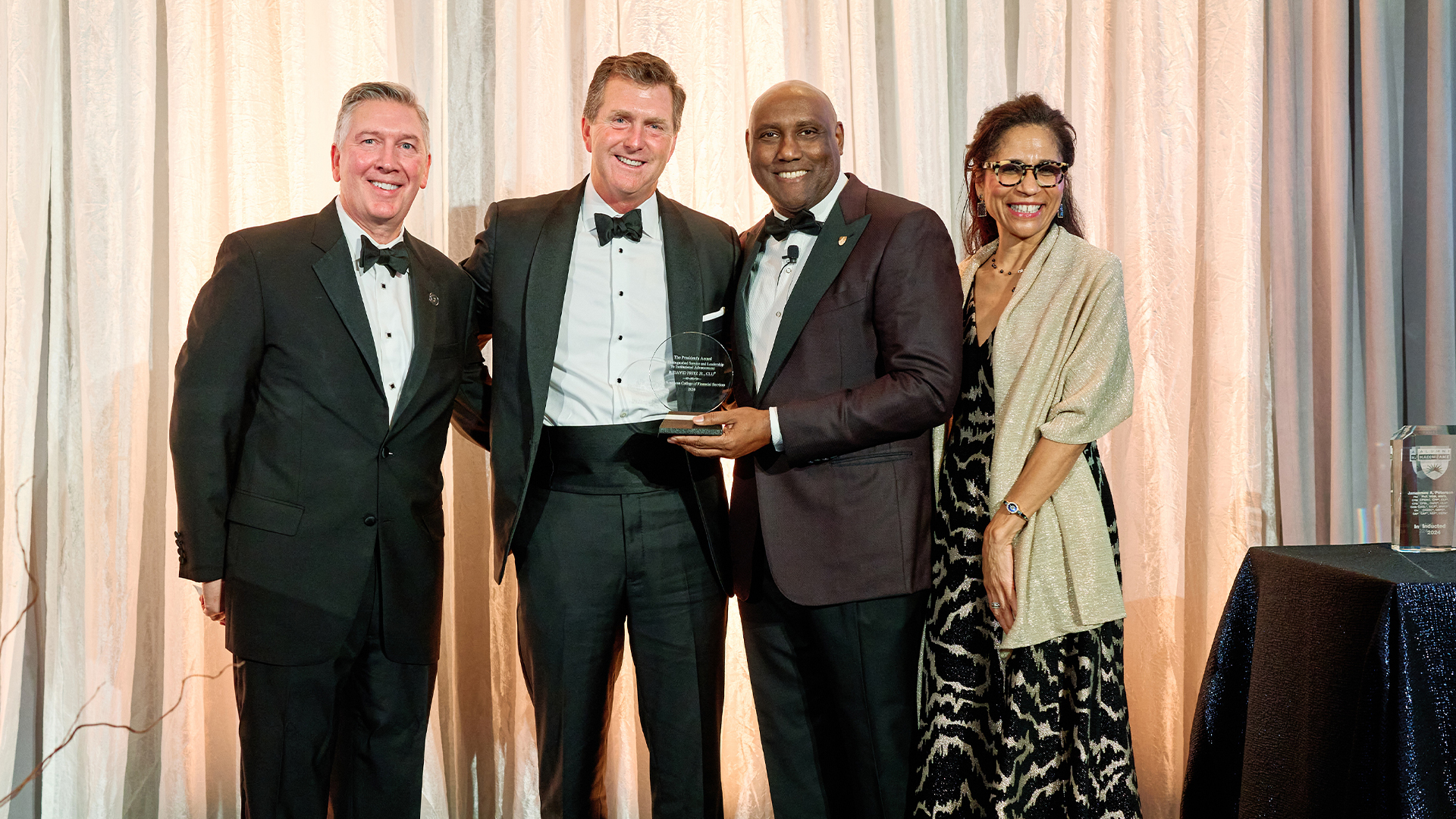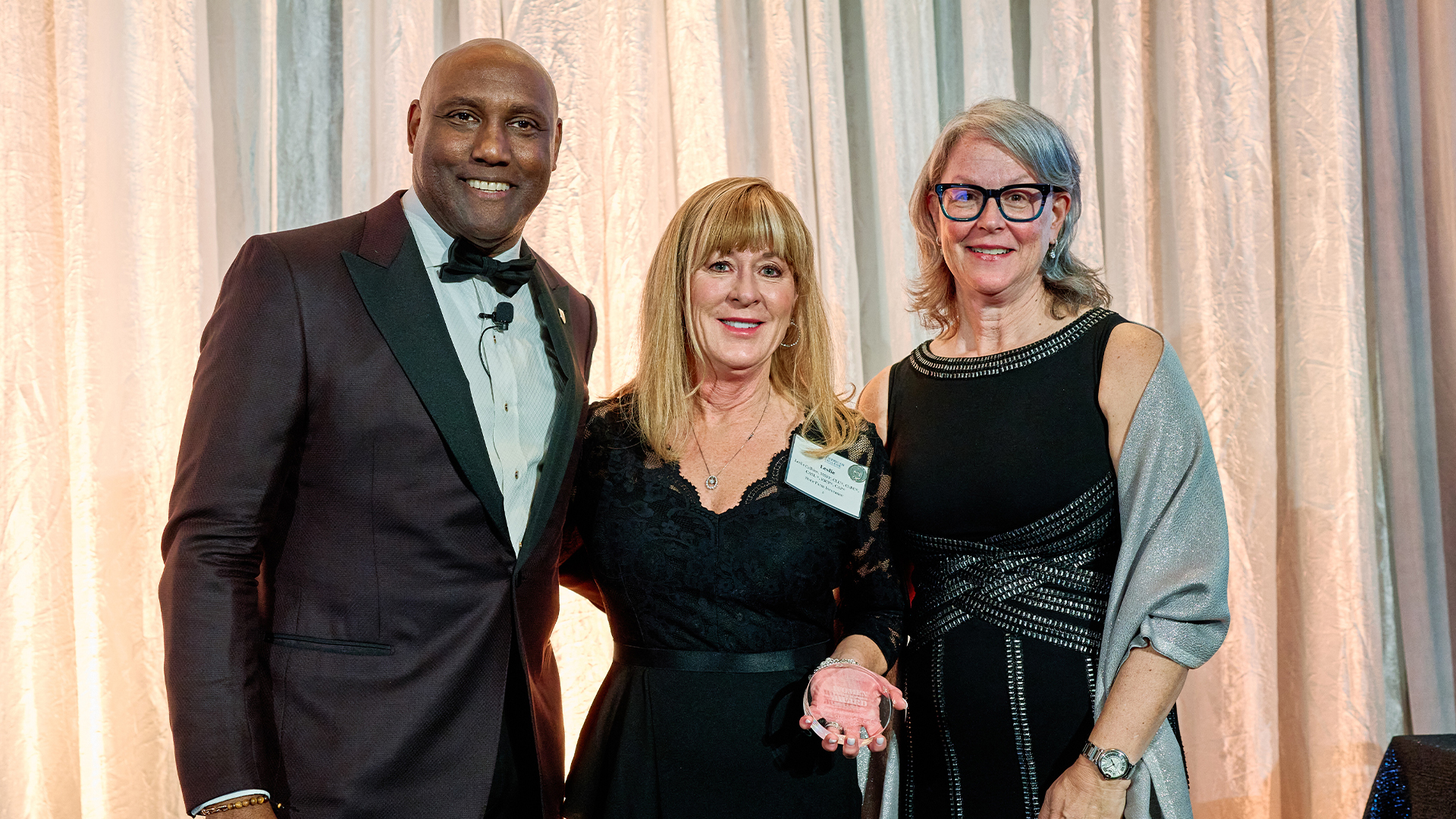About The College Diversity, Equity & Inclusion Insights
Cultivating a Community of Commitment

Held for the second consecutive year, the Advanced Special Needs Planning Symposium brought together professionals dedicated to working with special needs clients for two days worth of advanced learning sessions meant to improve participants’ understanding of special needs, disability, and long-term care planning. According to the managing director of the American College Center for Special Needs Joellen Meckley, JD, MHS, ChSNC®, the event served as a positive sign of The College’s support for advanced continuing education for practitioners in the field that have dedicated much of their practice and lives to serving this unique group of individuals.
Commitment to Quality Education
After initial opening remarks, the Advanced Special Needs Planning Symposium transitioned into its educational sessions. Featuring a number of high profile speakers, these presentations offered attendees insights into advanced techniques to assist special needs clients focused in areas such as tax, care management, housing solutions, advocating for clients, and more. When asked about the value of these sessions, Meckley stated, “People walked out with new tools, tips, techniques, (and) professional connections that they can incorporate into their practice immediately.”
The first day of the symposium ended with a networking reception that allowed the conference’s attendees an opportunity to meet and discuss the day’s events as well as the unique idiosyncrasies of their practice. Meckley, when reflecting on this networking event, stated that it brought a lot of value to attendees by bringing together seasoned professionals who may live across the country from one another to talk about their highly specialized practice and share advice with one another. It also served as a major learning opportunity for newer practitioners, offering them the chance to establish personal connections with veteran advisors. Meckley stated, “That kind of thing always goes hand in hand with this type of planning. It’s always a team effort.”
A Deep Dive on ABLE Accounts
The second day of the symposium kicked off with a learning session led by Jerry Hulick, a principal with Caring Consulting Group, and Eric Ochmanek, program director of ABLE Today. The two provided attendees with a detailed presentation on ABLE accounts and how financial planners can use these accounts to the benefit of their special needs clients. Learners received in-depth information on strategies for leveraging ABLE accounts, updates on legislation regarding these accounts, and specific tips and techniques that could help them make use of the information they were gaining in their own practices.
Closing the Symposium
Meckley shared some encouraging thoughts as the second day drew to a close.
"A lot of people here are very passionate about what they do and they have this personal sense of meaning in what they do. It's a unique room to be in."
- Joellen Meckley JD, MHS, ChSNC®
By serving this highly specialized group of practitioners who served a very specific client base, Meckley believes The College is making important strides in the field of special needs planning. “We’re…the only conference that I’m aware of that is specifically designed for financial professionals who are practicing (special needs planning)…There’s other education opportunities out there for them, but we are really kind of carving out a path here that is unique to The College.”
By allowing participants to take part in such a gathering, The College demonstrated a strong commitment to the specialized knowledge it touts as the backbone of their educational offerings. By helping experienced professionals become even better at what they do through highly specialized knowledge, The College makes good on its mission to improve society for the betterment of all Americans.
To learn more about The College’s efforts in the special needs community, visit the Center for Special Needs and the Chartered Special Needs Consultant® (ChSNC®) pages.
Diversity, Equity & Inclusion Insights
December Highlights from the Military Center

Thank You for Supporting the Military Community
To all supporters of the American College Center for Military and Veterans Affairs,
I wanted to take this opportunity to sincerely thank you for your dedication and unwavering commitment to the military community again this year. The impact and advancement of our mission would not have been possible without your support.
A special thank you to our Center Founding Partner and sponsor Penn Mutual and Advisory Council.
We look forward to the continuation of our work and expansion of our initiatives in 2025.
I wish you and your families happy holidays and ask that you keep those currently serving our country in your thoughts and prayers during the holiday season.
Very Respectfully,
Phil Easton
Managing Director, The American College Center for Military and Veterans Affairs
Attending AUSA’s 2024 Annual Meeting and Exposition
From October 14 through 16, staff from the American College Center for Military and Veterans Affairs attended the Association of the United States Army’s (AUSA) Annual Meeting and Exposition in Washington, D.C.
Attending for the first time, the Center for Military and Veterans Affairs was one of numerous exhibitors with Your Next Mission, a program initiative that helps veterans, transitioning services, and their families find employment.
Throughout the conference, staff had the opportunity to speak with numerous active duty, guard and reserve members, veterans, and spouses of the Army about the Center for Military and Veterans Affairs’ scholarship program and career services, detailing the benefits available to those transitioning out of the military and into civilian life with the goal of a career in the financial services industry.
The Center for Military and Veterans Affairs’ stewardship manager, Angelica Marino, also had the opportunity to be featured on Wreaths Across America Radio and inform listeners of initiatives and impact to the military community.
Honoring Heroes With Major General Suzanne Vautrinot
On November 14th, Major General Suzanne Vautrinot, USAF (Ret.), 2024 Soldier-Citizen Award Recipient, joined the American College Center for Military and Veterans Affairs for a webcast in honor of Veterans Day to share personal stories of service, sacrifice, and selflessness from her 31-year career.
She began by discussing how her service shaped her perspective on leadership and sacrifice. “Leadership is sacrifice, being there for the nation as a higher calling. Being there whenever they ask. The military assigns you to their needs and they ask you to go places that may not have been first or even last on your list. It is a sacrifice that gives back every single day.”
She continued by discussing her mentors and how the sacrifices made by veterans have shaped the identity of our nation. “You’re all into the bigger idea, something bigger than themselves. The greater good is international. We go around the world and protect their freedom. They are looking at what we created as veterans.”
The webcast continued by highlighting the skills, leadership qualities, and dedication developed through military service and how these attributes translate into successful careers in finance.
“Lifelong learning, professional development, ability to respond to a crisis, resilience, dedication, helping others, sacrifice—all of these attributes and skills from the military are a perfect fit for the industry.”
The webcast concluded with Major General Vautrinot addressing community engagement and cultural awareness of financial organizations. “Everyone in the industry is there to create a community. You had that community in the military. We are brothers and sisters at arms, and everyone is looking for that community.”
Military Center Featured at Alumni & Volunteer Breakfast
On November 8, the American College Center for Military and Veterans Affairs managing director Phil Easton joined fellow leaders of The College’s Centers of Excellence in a dynamic panel discussion tackling a pressing issue shaping the future of our industry: how to effectively engage the next generation of financial advisors and the impact of mass retirement within the financial services sector.
Homecoming 250 Navy Marine Corps
Homecoming 250 Navy Marine Corps is a 501(c)(3) non-profit dedicated to celebrating the 250th anniversary of the U.S. Navy and U.S. Marine Corps in their birthplace – Philadelphia and the Delaware River – as a grand opening event of the Semi quincentennial of the United States.
“The Navy and Marine Corps were both founded in Philadelphia,” said George Leone, President of Homecoming 250. “Both Philly and Camden were instrumental in building and deploying ships in the Revolutionary War and over the next 200 years.” Homecoming 250 wants to honor that history, support those who serve, salute our veterans, and remind us of what unites us.”
For the Navy 250th, Homecoming 250 plans to assemble historical and current ships for touring. For the Marine Corps 250th, Homecoming 250 plans to gather ships important to the Corps, host the 100th Marine Corps Ball where the first ball was held, and celebrate at the site of Tun Tavern, the birthplace of the Marines. Homecoming 250 is bringing these celebrations to Philadelphia, Camden, and the Delaware River to support our military, salute our veterans, and educate the public about the role of the Navy and Marines to defend America and freedom.
Festivities for the 250th anniversaries begin October 9 and run through October 16, 2025 [Homecoming 250 Navy Marine Corps, Oct. 2, 2024, “Homecoming 250 Navy Marine Corps Announces Epic 250th Birthday Celebration of the Navy & Marine Corps in Fall 2025 [Press Release]].
Thank You From Our Scholars
The American College Center for Military and Veterans Affairs received a thank you recently from one of our scholars. With his permission, we have made the letter available for you to read below.
Dear American College of Financial Services Center for Military and Veterans Affairs,
I cannot sincerely express my gratitude and excitement to have been selected as a recipient of your scholarship. Your generosity and support mean the world to me, my family, and loved ones.
This scholarship is not simply a financial burden off my back, but better yet, is a beacon of hope that one day I will achieve the goals I set out to achieve and more importantly, to continue to be an inspiration to my family, especially my children.
I come from humble beginnings and now that I’m older and more knowledgeable, I realize that money has never been the problem, but the lack of financial literacy. This scholarship will not only help me become a more prepared and knowledgeable financial services professional but will enable me to do the one thing I always wanted to do…. to help those who need it the most. To spread knowledge and financial literacy to as many people as possible.
Again, thank you for believing in my potential and investing in my education. I promise to make the most of this opportunity and contribute positively to this beautiful place we call earth.
With sincere gratitude,
Gabe Sanchez
College News Roundup November 16 30 2024
Financial Advisor | Helping Your Clients Select The Best Retirement Housing Options
November 18, 2024
Associate Professor of Succession Planning Chia-Li Chien, PhD, CFP®, PMP®, CPBC takes a look at how advisors can assist in picking the best living options for their aging clients.
InvestmentNews | More Professional Designations Mean More Success for Women Advisors
November 19, 2024
Lindsey Lewis, MBA, CFP®, ChFC®, managing director of the American College Center for Women in Financial Services, looks at how further education can empower women building careers in financial services.
InsurMark | Permission to Spend: Next Level Retirement Income Planning with Michael Finke
November 20, 2024
Wealth Management Certified Professional® (WMCP®) Program Director Michael Finke, PhD, CFP® speaks in this podcast episode about how advisors and clients can work together to maximize the use of the money they’ve spent a lifetime accumulating in retirement.
Business Insider | What Does a Financial Advisor Do?
November 21, 2024
This article breaks down the various roles a financial advisor can play in assisting their clients, including retirement planning through The College’s Retirement Income Certified Professional® (RICP®) designation.
Kiplinger | Sequence of Return Risk: How Retirees Can Protect Themselves
November 25, 2024
Based on research by College retirement expert and Professor of Practice Wade Pfau, PhD, CFA, RICP®, this article examines how retirees can work with their advisors to ensure the safe and secure drawdown of their assets as they age.
Kitces.com | Enhancing Client Conversations About Charitable Giving: Sample Questions, Scripts, and Tools for Better Engagement
November 27, 2024
College Adjunct Professor Kathleen M. Rehl, PhD, CFP®, CeFT® Emeritus, discusses how advisors can begin conversations on charitable giving with their clients.
Financial Advisor | Is The Dream Of A Florida Retirement Over?
December 1, 2024
In the aftermath of severe hurricanes striking Florida, Professor of Practice Steve Parrish, JD, RICP®, CLU®, ChFC®, AEP® examines whether the state is still a prime place for retirees to move.
New Donor Advised Fund Professional Certificate Program

KING OF PRUSSIA, PA – January 2, 2025 – The American College of Financial Services is excited to announce the creation of its Donor-Advised Fund (DAF) Professional Certificate Program. This program aims to empower staff at DAF-sponsoring organizations to create a shared standard of knowledge and competency for the DAF industry. Registration is now open for the inaugural program, which will be held in-person at The Adolphus in Dallas, Texas, from April 8-9, 2025.
This industry-first certificate program will offer a complete picture of day-to-day DAF program management and include sessions on the evolving philanthropic landscape, understanding motivations to give, identifying assets to donate, managing gift acceptance, effective grantmaking principles, investment strategy alignment, building strong relationship management, planning for succession of funds, and DAFs as part of estate planning. The curriculum will include 12 to 15 hours of instruction and valuable networking opportunities.
“Building a shared understanding of DAF management and application ties deeply to The College’s mission of applied knowledge, dating back to our founding in 1927,” said George Nichols III, CAP®, president and CEO of The College. “Our new DAF Professional Certificate Program continues our legacy of standard-setting applied knowledge that takes what’s in a textbook and brings it to life, so DAF professionals can apply this knowledge immediately.”
The College has developed its new DAF Professional Certificate Program in collaboration with four premier sponsors: Fidelity Charitable, National Philanthropic Trust, Vanguard Charitable, and DAFgiving360. These partners bring extensive expertise and resources, ensuring participants gain insights from leading organizations in the field. The program also incorporates guidance from Daylight Advisors and other stakeholders to provide a comprehensive understanding of DAFs and enhance the overall educational experience.
“Investing in education around DAFs is essential for the future of philanthropy,” said Chia-Li Chien, PhD, CFP®, PMP®, Associate Provost, Undergraduate & Graduate Programs. “This program will enhance the skills of DAF professionals but also elevate the entire philanthropic ecosystem.”
The DAF Professional Certificate Program aims to establish a common language and set best practices, ensuring that participants emerge as informed leaders. Upon completion, learners will receive a certificate and a digital badge recognizing them as a DAF Certified Professional.
For more information about the program, please visit www.theamericancollege.edu/DAF.
###
ABOUT THE AMERICAN COLLEGE OF FINANCIAL SERVICES
Founded in 1927, The American College of Financial Services is the nation’s largest nonprofit educational institution devoted to financial services professionals. Holding the highest level of academic accreditation, The College has educated over 200,000 professionals across the United States through certificate, designation, and graduate degree programs. Its portfolio of applied knowledge also includes just-in-time learning and consumer financial education programs. The College’s faculty represents some of the foremost thought leaders in the financial services industry.
Visit the rest of our site and connect with us on LinkedIn, Instagram, Facebook, and YouTube. Discover all the ways you can expand your opportunities with us.
Contact
Sarah Tremallo
908-967-0381 / Stremallo@jconnelly.com
Jared Trexler
610-526-1268 / jared.trexler@theamericancollege.edu
About The College Diversity, Equity & Inclusion Financial Planning Retirement Planning Podcasts
What’s Next in Lifelong Learning

In this episode of our Shares podcast, Chief Marketing and Strategy Officer Jared Trexler and College President and CEO George Nichols III, CAP® sit down for a wide-ranging discussion on The College’s major accomplishments in 2024, how the financial services industry and higher education are changing, and how The College is moving to meet the moment in 2025 and beyond.
George Nichols III, CAP® currently serves as the 10th president and CEO in the storied history of The American College of Financial Services. Nichols joined The College after a 17-year stint at New York Life, where he held principal roles in sales, P&L, strategic initiatives, and public policy. In 2007, Nichols was named to the company's executive management committee. He also served as executive vice president in the Office of Governmental Affairs. Before joining New York Life, Nichols was the state of Kentucky's first Black insurance commissioner, leading regulation of the state's $10 billion insurance industry through his expertise in health insurance reform and financial services integration. He gained this knowledge through stints as the executive director of the Kentucky Health Policy Board, vice president of marketing for Athena of North America, executive director of product development with Blue Cross Blue Shield of Kentucky, CEO of Central State Hospital in Louisville, and executive assistant to the Commissioner of the Kentucky Department for Mental Health Services.
Nichols has been acclaimed for his efforts to drive transformative change in diversity, equity, and inclusion in the financial services profession and elsewhere. Savoy, a leading Black business and lifestyle magazine, named him among the "Most Influential Black Corporate Executives" twice: in 2012 and 2018; and among the “Most Influential Black Corporate Directors” in 2021. He was named to Forbes' inaugural 2021 edition of "The Culture 50 Champions." Nichols was also honored as one of "The Ten to Watch in 2021" by WealthManagement.com, and in 2022, he won a ThinkAdvisor LUMINARIES award for Executive Leadership, followed by InvestmentNews’ recognition in 2023 for the year’s See It, Be It role model. Additionally, Nichols is the inaugural recipient of the Alonzo Herndon Award by Business Insurance Magazine.
Any views or opinions expressed in this podcast are the hosts’ and guests' own and do not necessarily represent those of The American College of Financial Services.
More From The College
- See More Content from Our President
- View Our Strategic Priorities
- Enroll in Our Tax Planning Certified Professional™ (TPCP™) Program
Author
Subscribe to Newsletter
Related Posts
How to Best Integrate Tax Planning Into Your Financial Planning Process
Author
Subscribe to Newsletter
Related Posts
President’s Dinner
Subscribe to Newsletter
Related Posts
Integrating Tax Planning Into Financial Planning

In the webinar, Tax Planning Certified Professional™ (TPCP™) Program Director Sophia Duffy, JD, CPA, AEP® and Professor of Practice in Tax Planning Jeffrey Levine, CFP®, CPA/PFS, ChFC®, RICP®, CWS, AIF, BFA™ discuss proven strategies to uncover tax-saving opportunities, how to incorporate them into comprehensive financial plans, and the value this brings to client service.
Whether you're an experienced advisor or looking to expand your expertise, this session provides the tools to deliver tax-efficient solutions that align with your clients' financial goals and drive better outcomes.
More From The College
Philanthropic Planning Insights
Discussing Donor-Advised Funds at FinServe Summit

Joining President Nichols for the panel discussion were FinServe Network ambassadors Rick Peck, CFP®, ChFC®, CAP®, an independent philanthropy consultant, and Mary Fischer-Nassib, CAP®, co-founder and CEO of the charitable organization Sow Good Now. Both ambassadors came prepared to dive deep into donor-advised funds (DAFs), one of the biggest trending topics in the philanthropic planning space today. A DAF is an account where an individual can deposit assets for donation to charity over time, recommending how to invest the assets or where to donate them and perhaps having a sponsor organization manage the account. DAF owners can also claim a tax deduction for making contributions to the fund each year.
While Nichols acknowledges there are many ways to give, including through checkbook giving or private foundations, he says he is amazed by how simple it is to set up a DAF today and how popular they are becoming. Peck credits these funds’ popularity with their ability to bypass complex giving schemes and make charity easy.
“DAFs used to have a $5,000 minimum threshold; now it’s $0, which makes them far more accessible,” he said. “People can give to others’ DAFs if they don’t want to create their own, costs are generally low, and there are many different investment or giving choices: you can set money aside in a DAF but delay the giving until you really want to do it.”
How to Use Donor-Advised Funds
While both Peck and Fischer-Nassib say they work with DAFs often in their businesses, the industry still needs to understand how to work with them more effectively.
“About 30% of the gifts we see today come from DAFs, but only 15% of nonprofits are set up to accept non-cash assets through DAFs; the problem is that non-cash assets are actually the majority of assets we see transferred,” Fischer-Nassib said. “We as an industry need to get educated, comfortable, and confident on how to use DAFs because they’re growing in popularity.”
Peck agrees with her assessment. “A lot of nonprofits are asking for cash only, even though most people aren’t in a position to give cash,” he said. “Instead, most people want to give other things: retirement plans and real estate; stocks, bonds, or mutual funds; cash value of life insurance; and personal property. Many nonprofits aren’t comfortable taking those because they’re not as easy to tabulate, but those gifts capture a lot of wealth that might not otherwise be going to charity.”
The ambassadors emphasize that there may be a steep learning curve for financial professionals who are unfamiliar with DAFs or charitable giving in general, but that the importance of understanding them justifies the investment of time. They say DAFs are a tool that can be used in many different professions and areas of financial planning and that they are one of the most effective, efficient, and powerful tools in a planner’s arsenal.
Regulating Donor-Advised Funds
President Nichols and the ambassadors also discussed the controversies surrounding DAFs, mainly consisting of unclear or inconsistent regulation and a public relations issue where some may see DAFs as hoarding vehicles: an avenue to avoid taxes by hiding away money but never using it to give. Peck, however, says this perception is unfounded.
“We actually see over 20% of DAF funds being distributed to communities and charities, with about $300 billion in all the DAFs out there,” he said. “In contrast, private foundations have $1.3 trillion all told, and yet they only distribute about 6% on average. There’s really no contest as to which is giving out more.”
However, the ambassadors did acknowledge the fiduciary uncertainty surrounding regulation of DAFs and how the financial services industry should approach using them. They say financial professionals have often been on the sidelines when it comes to managing DAFs and not intimately involved with the actual process of giving — something they hope will change given more education on the subject.
“If nonprofits are seeking funding and can’t get it through traditional sources, The College should get involved with educating people on how DAFs can be useful,” Fischer-Nassib said. “As a nonprofit leader, I’m looking for gifts given over several years, which DAFs are very useful for. They give you more muscle as a donor and more potential support from nonprofits as an advisor.”
In conclusion, our ambassadors say education is key to combating misconceptions about DAFs and other methods of philanthropic planning, as is recognizing the many different ways people can give — from their time and talent to treasure, testimony, and other methods. They say a more modern conception of giving is needed to encompass all the alternatives financial professionals have and the good they can do.
“Much of traditional philanthropy is top-down: people tell an underserved community what they’re going to do for them, or what they’re allowed to do with the money they’re given,” Fischer-Nassib said. “But if we really believe in those communities and want to give them resources but let them make their own decisions about what they need to thrive and succeed, DAFs are one of the best ways to make that happen.”
More From The College
- Meet Our FinServe Network
- Learn About Our Donor-Advised Fund Professional Certificate Program
- Learn About Our Chartered Advisor in Philanthropy® (CAP®) Designation
Celebrating Our Most Loyal Supporters


The American College of Financial Services is committed to delivering the highest quality applied education to the professionals entrusted with the public’s financial wellbeing. The yearly President’s Dinner serves to highlight what’s new and exciting at The College while recognizing the significant contributions of some of the generous supporters who help make it all possible.
Awards Presentation
Each year, the President’s Dinner includes a series of award presentations to recognize the contributions of financial services leaders who have inspired us with their passion and commitment to helping The College achieve its mission.
Congratulations to this year’s recipients:

Huebner Gold Medal: Sy Sternberg, CLU®
Sy Sternberg. CLU® is the former chairman and chief executive officer of New York Life Insurance Company. He joined the company in 1989 as a senior vice president, was elected vice chairman of the board in February 1995, and became president and chief operating officer in October 1995. He became chairman and CEO in 1997 and remained CEO until his retirement in 2008.

President’s Award: R. David Fritz Jr., CLU®
R. David Fritz Jr., CLU® is the co-founder and managing partner of Executive Benefits Network and a 38-year veteran of the financial services industry. David began his career in the insurance industry in 1986 after graduating from Williams College with a BA degree. David started at UNUM Life Insurance Company as a group sales representative in Washington, DC, and then later became an employee benefits manager in UNUM’s Milwaukee, WI office. David joined Northwestern Mutual in 1993 and founded Executive Benefits Network 23 years ago. He specializes in the design, funding, securing, and administration of non-qualified deferred compensation plans and bank-owned and corporate-owned life insurance programs.
David and his wife Molly are very active in philanthropic efforts. He is a past trustee of The American College of Financial Services and currently serves on the President’s Council. He and Molly live in River Hills, Wisconsin with their six children.

Alumni Hall of Fame: James A. Petersen, PhD, MSM, MSFS, CPMBC, CFP®, CLF®, CPBL, ChFC®, CLU®, CASL®, RICP®, WMCP®, ChSNC®, CRPC®, CAP®, AEP®, CEPA®
Jim Petersen is the chief executive officer (CEO) and founding principal of Diversified Professional Coaching, LLC. Jim is also the president and owner of the Professional Business Coaches Alliance, LLC, which is committed to training and supporting the future of professional business coaches. In addition, Jim is a serial entrepreneur who is involved in a variety of businesses including a car wash and a bio-hazard cleanup company.
As Roger Hull/James S. Bingay Chair of Leadership at The College, Jim is the program director for the Chartered Leadership Fellow® (CLF®) Program and serves in an emeritus capacity on the Alumni Council, as well as outgoing chair of the American College Center for Military and Veterans Affairs advisory council.

Second Century Society: Charles R. (posthumously) and Mary M. Wright
Charles (Chuck) and Mary Wright met at Yankton College in Yankton, South Dakota. Together, they were leading donors to The College, with an emphasis on the American College Center for Women in Financial Services.
Chuck was senior executive vice president and chief agency and marketing officer at State Farm Insurance Companies. He later served as chairman of the board of trustees and was a driving force behind the creation of the Chartered Advisor in Philanthropy® (CAP®) and Chartered Advisor of Senior Living® (CASL®) designations.
Mary’s years of service through philanthropy led her to complete her CAP® designation, which she would use to help others engage in philanthropic work as well. As a passionate lifelong learner, Mary continues to carry on Chuck’s legacy by laying the foundation for the Wright Fellowship under the Center for Women in Financial Services.
The College is proud to recognize Chuck and Mary’s continued impact.

Women Working in Wealth: Leslie Susanne Calkins, MSFS, CLU®, ChFC®, CASL®, RICP®, CAP®
Leslie Susanne Calkins has a passion for sharing and giving back. She utilizes the knowledge she gained from The College to better serve her community through her career at State Farm. Education and philanthropy were key values in her family, which continue to inspire her today.
Since receiving her MSFS degree, Leslie is proud to share how each course has made her more confident, knowledgeable, and able to help others in so many ways. She continues to give back by serving as an annual senior counselor at the Rotary Youth Leadership Awards. This leadership conference changes the lives of high school students in Colorado and Wyoming and is the highlight of her year.

NextGen Financial Services Professional Award: Gloria S. Garcia Cisneros, CFP® & Brandon Lovingier, ChFC®, MQFP™
Gloria Garcia Cisneros is a Wealth Manager in Los Angeles with the firm LourdMurray. As a first-generation Mexican immigrant, she's passionate about empowering underserved communities through financial education. Gloria holds various degrees from UCLA in applied mathematics and Spanish community and culture. She is actively involved in various professional and community initiatives, serving on committees and advisory boards for organizations where she contributes to developing financial education programs and increasing diversity within the finance industry.
Brandon Lovingier has a passion for helping people with their finances. While on active duty in the Army, Brandon pursued his education, earning the Chartered Financial Consultant® (ChFC®) designation in 2022. He’s also one of the first to hold the Military Qualified Financial Planner™ (MQFP™) designation. He’s currently pursuing the Accredited Financial Counselor® (AFC®) designation. His blog, Enlisted Money, helps enlisted service members on their own personal finance journey, while his book, Enlist to Wealth, is currently in the editing stages. He is set to retire from the Army in February 2026, when he will return to Kansas City with his wife and son to continue pursuing his passions.
Venue
A sophisticated staple of Center City, The Four Seasons at the Comcast Center is located in Philadelphia’s tallest building, complete with unobstructed city views, luxury hotel rooms, and access to conference and event spaces. Guests were treated in high style as The College celebrated the accomplishments of distinguished honorees.
The President
President and CEO of The College George Nichols III, CAP® presided over the 2024 President’s Dinner. He reflected on a transformative year while looking toward the future. In recognizing the community that makes up The College, George invited guests to lead the way for the financial services profession by uplifting and benefiting society. It was an inspiring message reminding all in attendance that the arc of change requires forward-thinking and innovative leadership.